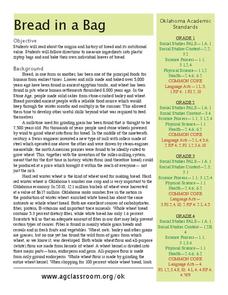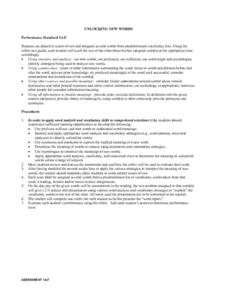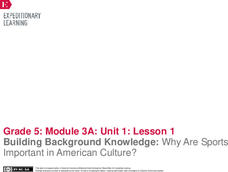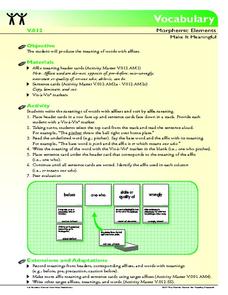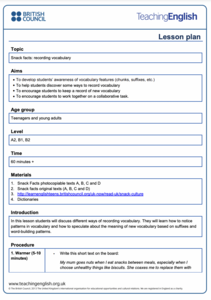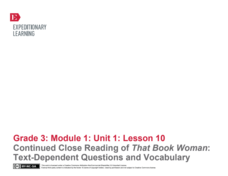Florida Center for Reading Research
Vocabulary: Words in Context, Ask-Explain-List
Engage young readers in using context clues with this collaborative vocabulary activity. In pairs, children draw from a deck of cards, with each card asking a question about a context involving a specific vocabulary word. After...
Institute for the Professional Development of Adult Educators
Using Context Clues with Signal Words
When you come across an unfamiliar word in a text, do you skip it and move on? Practice using context clues to identify words you don't know with a thorough set of language arts lessons. The resource reinforces close reading and critical...
Achieve3000
Context Clues and Idioms
Kids practice using five types of context clues (definition, synonym, antonym, example, and general) to decode idiomatic language.
Curated OER
Using Context Clues
Middle schoolers receive a handout that lists the five types of context clues. The class divides up into groups of three or four, and each group chooses five unfamiliar words. They write a multiple-choice question for each of their five...
EngageNY
Continued Close Reading of Bullfrog at Magnolia Circle: Text-Dependent Questions and Vivid Words and Phrases
In the third activity from this unit based on the book Bullfrog at Magnolia Circle, learners focus on using specific details from the text-to-answer questions about the habitat of bullfrogs. While reading the text, young...
Curated OER
Context Clues, Plot Structure, Conflict, and Personal Narrative Essay
What are the elements of a personal narrative? Get your class talking by reading "The Necklace" and "A Dangerous Game." The lesson plan focuses primarily on defining certain vocabulary terms (like context clues, plot, conflict, climax,...
National Endowment for the Humanities
Language Analysis Based on Stave 1
Class members meet the original scrooge, the Dickens character whose name has become synonymous with a cold-hearted, tight-fisted, miser. Using the provided worksheet, readers closely examine context clues to determine the meanings of...
Vocabulary A-Z
5-Day Vocabulary Teaching Plan
Reinforce important reading skills with a set of vocabulary lesson plans. Middle schoolers complete sentences, play word games, finish analogies, and build their growing vocabulary with a packet of helpful and applicable graphic organizers.
Curated OER
Bread in a Bag
Could the history of bread really be interesting? Yes, it could! An informational text gives scholars wheat production background from 8,000 years ago, discussing different types of bread and the current industry in Oklahoma. Learners...
Curated OER
Hoot: Vocabulary Squares
Study the vocabulary from Carl Hiaasen's Hoot with an activity featuring synonyms and antonyms. Kids fill in a graphic organizer for each word, prompting critical thinking as they find additional ways to put the word into context.
EngageNY
Identifying Author’s Opinion and Evidence: The Value of Sports in People’s Lives, Part II
Context matters! Using the intuitive resource, pupils decipher context clues to determine the meaning of unknown words from an informational text. Also, in small groups, they practice identifying the author's opinion and supporting...
Curated OER
Man's Search for Meaning: Vocabulary Strategy
Readers of Man's Search for Meaning use context clues, create stories using words from the text, and retype these stories as part of their vocabulary study of Viktor Frankl's book.
Curated OER
My Antonia: Magic Squares (Vocabulary Strategy)
Help your pupils discover the power of context clues by teaching the this vocabulary strategy. Designed to go with words from Willa Cather's My Antonia, this exercise focuses on having individuals use their own words to define new...
Curated OER
Unlocking New Words: Partner Presentations
Following extensive modeling about how to apply word analysis and vocabulary skills to learn new words, partner teams create brief word presentations to teach new vocabulary to the class. Preselect words from upcoming social studies,...
Curated OER
Baseball Vocabulary Game: ESL Beginners
The most valuable part of this lesson is the instructions to "Vocabulary Baseball," which can be applied to any vocabulary or key terms list. The game uses word boxes and the autobiography of Roberto Clemente, which the lesson describes...
Curated OER
Vocabulary: Make Connections with New Vocabulary
The story Hansel and Gretel is used to build new vocabulary in context. The class reads the story together. They then focus on 2-3 new vocabulary words, using the context of the story to help define them. This lesson is fully scripted...
EngageNY
Building Background Knowledge: Why Are Sports Important in American Culture?
What makes sports so special to many Americans? Scholars ponder the question as they participate in a gallery walk, immersing themselves in images and texts about sports. Pupils also complete a vocabulary strategies anchor chart to...
Florida Center for Reading Research
Vocabulary: Morphemic Elements, Make It Meaningful
Scholars learn to find meaning in words using affixes with a language arts activity. In pairs, children sort cards with printed sentences that include words with the prefixes mis- and pre- and the suffixes -er, -ness, and -able. Then,...
British Council
Snack Facts - Recording Vocabulary
What's in a word? Scholars look at a sentence written on the board about snacks. They discuss unfamiliar terms and then record the new words by drawing a picture, writing a synonym, writing a translation, or creating a mind map. Pupils...
EngageNY
Continued Close Reading of Rain School: Text-Dependent Questions and Vocabulary
The engaging story Rain School is further explored in the third lesson of a larger unit that explicitly teaches close reading skills by answering questions whose answers can only be found inside the text. Through teacher...
EngageNY
Continued Close Reading of That Book Woman: Text-Dependent Questions and Vocabulary
Explicitly explained and delightfully detailed are two ways to describe this tenth lesson plan in a larger unit designed for the first few weeks of third grade. Learners continue to use and develop previously learned close reading...
Houghton Mifflin Harcourt
Around Town: Neighborhood and Community: English Language Development Lessons (Theme 3)
Here is a unit designed to support English language development. Scholars speak, move, and write to learn more about topics that focus on community and local concepts. The series of lessons aids to reinforce concepts...
ESL Library
Mardi Gras
Learn about the festivity of Mardi Gras with a series of reading and writing assignments. As class members read a passage about the history of Mardi Gras and the way it's celebrated around the world, they answer comprehension...
EngageNY
Building Background Knowledge: Close Reading Part 2 of “Shrouded in Myth”
That was a good talk. Scholars learn about how to conduct a good discussion. They use chart paper and markers to record and discuss expectations for members when working in a group. They then take a look at vocabulary...








